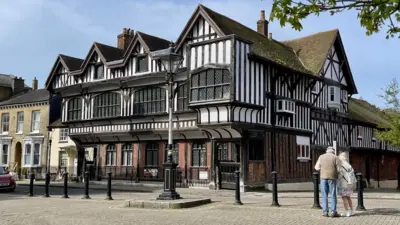We've updated our Privacy and Cookies Policy
We've made some important changes to our Privacy and Cookies Policy and we want you to know what this means for you and your data.
Owami Davies: Review finds 'no racial bias' in investigation
Image source, OWAMI DAVIES
A joint Met and Essex Police review into how the case of a black student nurse was handled has concluded there was "no evidence" of racial bias.
Owami Davies, 24, went missing from Grays, Essex in July and was found safe in Hampshire seven weeks later.
Several appeals were made and more than 100 sightings of her were reported.
The review followed criticism of the police investigation and claims the case would have been handled differently if Owami was white.
The police investigation was criticised due to the length of time it took for officers to trace Ms Davies, despite five arrests being made and 117 reported sightings.
The case attracted further criticism after an incorrect CCTV image was released, which police said was of Owami, but was actually of another black woman.
The review said this was a "mistake due human error" and was corrected as soon as it was noticed.
"There was no evidence of racial bias," the review said.
Image source, Owami Davies
Before she went missing, Ms Davies was nearing the end of her studies at King's College London and had an interest in doing research on diseases.
Soon before she was found, after the 118th reported sighting of her, it emerged that officers had spoken with her in south London on the day she was reported missing.
Her family reported her disappearance to Essex Police on 6 July. Later, officers from the Met were called to Clarendon Road, Croydon, over concerns about the welfare of a woman. However, Ms Davies told them she did not want their help and left.
The Met said officers could not have known that Ms Davies was a missing person because she was not yet marked as such on the police database.
'Compassion and care'
The review, published on Friday, confirmed this. It also said their information was not up to date because Essex Police were dealing with two "high-risk" missing person's cases and did not immediately add Owami's case to a national database.
However, the review said, that, as Ms Davies had declined to give officers her details, they would not in any case have been able to link her with any active case.
The review said Met officers "showed compassion and care" when they encountered Ms Davies in Croydon.
Commander Paul Brogden added that officers "faced a difficult balance in seeking support for her, while respecting her wish for privacy and request to be left alone".
Among the critics of the investigation was former Ch Supt Dal Babu. In an article in the Guardian newspaper, he asked "What would the Owami Davies case look like if she were a blonde white woman?".
He added: "I remember as a young PC in 1983 the problems of transferring missing person inquiries from the Met to Essex and other forces. The process was clunky and did not work. Fast forward 40 years, we have a missing person and it's still not fixed."
Commander Brogden said the force is "alive to concerns from the black community" that Owami's race influenced their response to her disappearance. He said independent advisors on race, who were asked to scrutinise their handling of the case, were "satisfied there was no evidence of racial bias".
Commander Brogden said, however, the review identified some "learning points", including the way in which missing person's inquiries were transferred from one force to another, to ensure they were "swiftly" dealt with.
In the review are nine recommendations for the Met and six for Essex Police, which the review said would benefit them in future investigations.
"The Met received 43,040 missing person reports in the year to May 2022. Each investigation has a unique set of circumstances and requires a proportionate policing response. We will use the findings of this report to improve our service to Londoners," he said.
An investigation by the Independent Office for Police Conduct, which was ordered when it emerged officers had spoken to Ms Davies on the day she was reported missing, was dropped when she was found.
Follow BBC London on Facebook, Twitter and Instagram. Send your story ideas to hellobbclondon@bbc.co.uk
Top Stories
Features & Analysis
Most read
Content is not available








